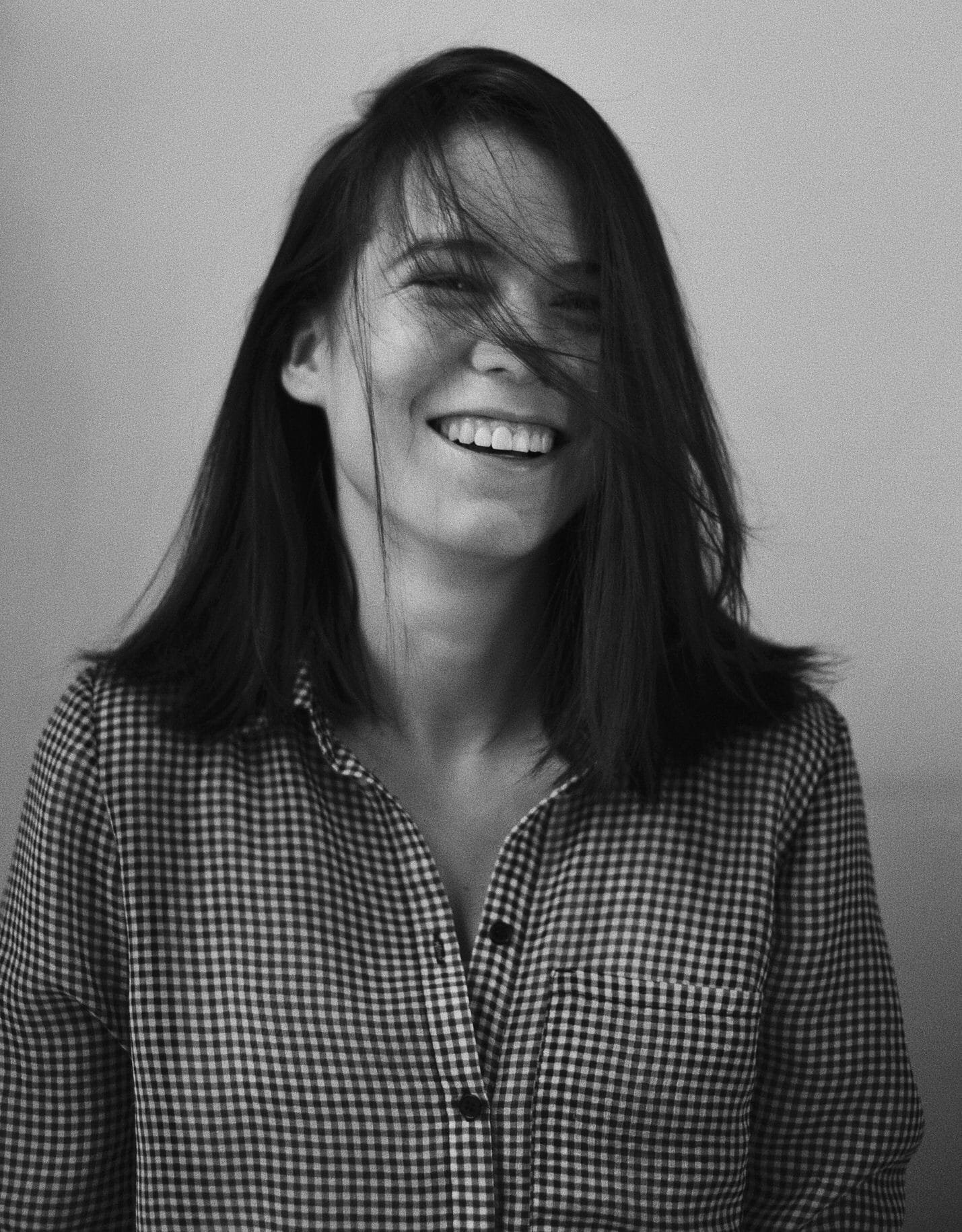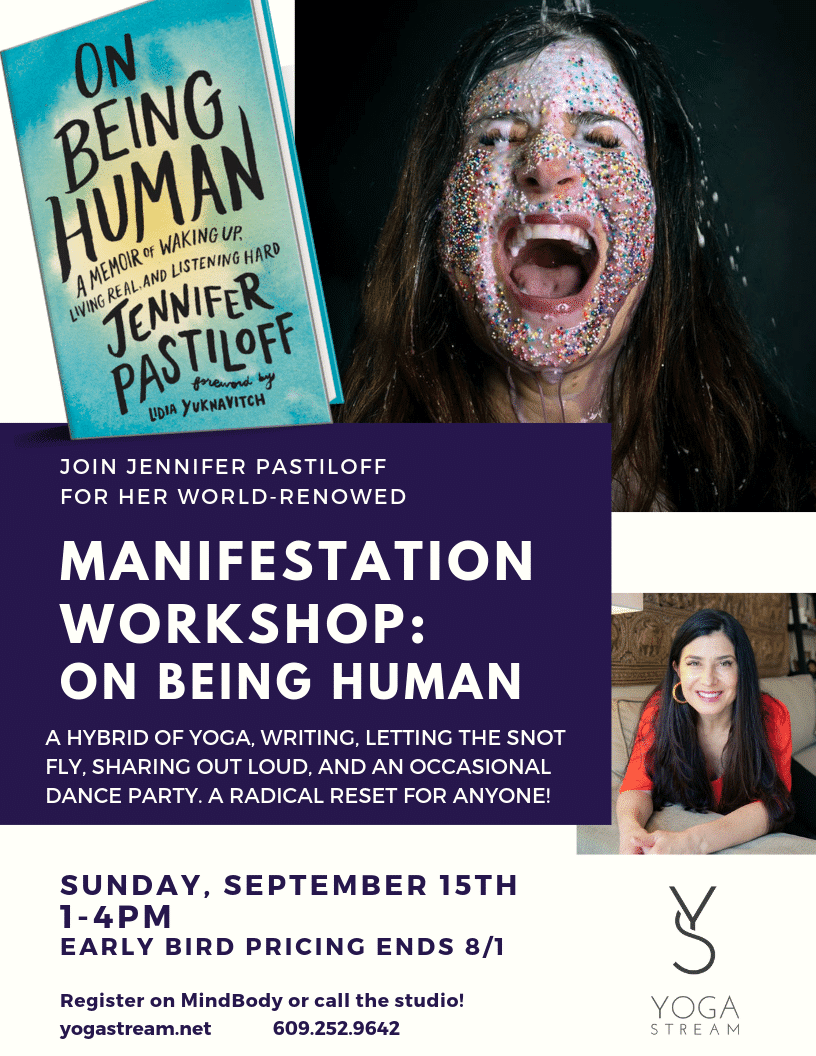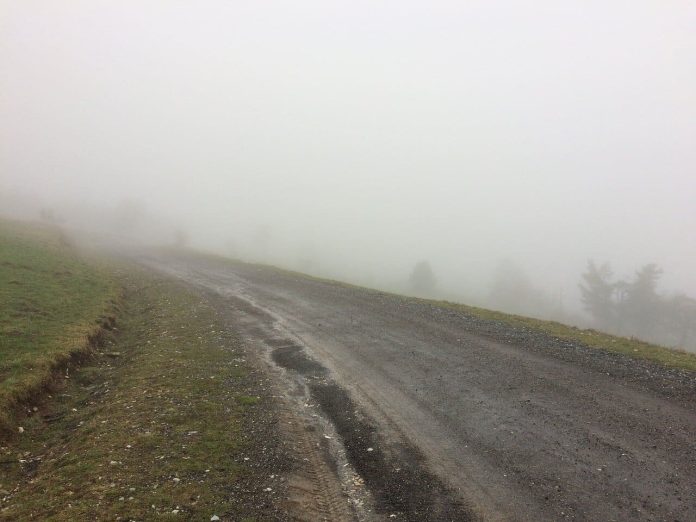By Anna Linskaya
“So you’re doing Camino, right?” the Argentinian sitting next to me said, nodding at the trekking pole squeezed between my knees.
“Yep,” I replied.
“Alone?”
“Yep.”
“That’s a bad option in winter, especially for you.”
“For me?”
“For the girl.”
I shrugged, and he continued: “Do you even speak Spanish?”
“No, but it’s not a big problem,” I answered, thinking to myself, everything happening right now is a big problem.
“Let’s see when exactly the sun goes down,” he said, taking out his phone, “Ok, you have to be at your overnight stay by five.”
***
The first time I thought about the road was at my psychotherapist’s. Then in Istanbul, sitting on an unmade bed with my sneakers on, asking the person I’d been with for almost six years, “Do you like spending time with me?” when I meant to say, “I don’t think this is working out.” The third time was in Moscow when I opened up my calendar to see job interviews scheduled for the month ahead. Three days after that I was on a night bus, on the outskirts of a small Spanish town.
I leaned my forehead against the window, trying to see outside.
“Just be home before darkness,” the Argentinian said, before turning away.
We stopped. The driver tossed my backpack from the luggage area and got back on the bus, all this accomplished in less than a minute. I descended the bus, zipped up my down jacket and took out my phone to draw the route to the albergue.
***
“The road must eventually lead to the whole world,” Jack wrote.
At the very least, the road was supposed to lead me to the Cathedral of Saint James in the city of Santiago de Compostela. Since the Middle Ages, pilgrims have been crawling there guided by the yellow arrows that are found all over the country. Today in high season, thousands of them send their backpacks ahead in cabs, then stop in restaurants and spend nights in hotels. In winter, there are almost no people. Nothing works, the villages are empty, and tall snowdrifts lie at intervals or rain pours incessantly. The route must be drawn carefully so no one finds themselves without a roof at night. Only municipal albergues are open, sometimes with bedbugs, often without heating.
That was exactly what I needed. Everything started to make sense as soon as I got on the road that first morning, and saw two long-legged birds with wide wings.
Storks, I thought and froze so as not to frighten them off. The birds took to the sky, made two smooth circles around me, and flew away.
I learned quickly: walk on, occupy the bed away from the window, put bandaids on blisters. There was nothing better in the world than just going forward — there was nothing in the world at all except the road I was on.
Once I met an old Spaniard named Santiago, a retired surgeon. We walked together several dozen kilometers to the overnight stay, although he barely spoke English and I could only order a ham sandwich in Spanish. An hour later, more pilgrims burst into the house, shaking the snow off their backpacks and shouting at each other in different languages.
Santiago turned to me, pointed to one of them and said, “This is Daniel.”
I watched Daniel while he walked, limping on his left foot. On rainy days he looked like a hunchback-hermit with his head-to-toe raincoat over a huge backpack — bigger than all of ours and filled with unnecessary things. Sometimes he sang loudly, but more often than not, he talked incessantly.
“I am not a very sociable person,” he would say, and Jung from Korea and I would smile quietly at each other.
Daniel laid his stories out in front of me like cards in solitaire. He told me about the man who drowned before his eyes, his hallucinations, and his father wanting to hand him over to the police.
***
There is one memory I try not to think of so much, so as not to exhaust it. One morning, I walked along a narrow path to a cliffside and watched small toy cars driving along a small toy highway below. I caught up with Daniel in the late afternoon and we continued on together, slipping on wet stones on the long upward path with our hands on our knees.
Finally, we reached the end of the rocky path. Rain and sweat trickled down my cheeks. I caught sight of Jung’s blue raincoat in the far distance. I looked Daniel in the eyes. And then — down, away, into the depths, an infinite space with weather-stained slopes as rough as a pomegranate’s skin. I do not know how long we were sealed in this space-time continuum, but I breathed in only when Jung appeared. He walked slowly to the very edge, stopped and shouted loudly, cupping his hands around his mouth.
After a couple of seconds, Daniel and I joined him, making animal sounds and listening as they bounced off the mountains, and descended into the fog like in a cup of milk.
That evening Daniel went to Mass. In a small brick church ten people could only fit in I stood in the back leaning against the doorframe and watched him kneel; wet black hair stuck to his forehead, white knuckles on his tightly сlasped hands, eyes squeezed shut, lips moving silently. It was both frightening and fascinating; I could hardly tear my eyes from him, struck with a feeling that I was watching something personal.
A few days later, I met Sam, when the dry vineyards began to appear along the road, rising from the ground like old crooked hands. I had seen him before with Daniel; tanned, loud, with dark, curly hair and a clean, wide smile. Sam caught up with me near the end of that day’s route and we exchanged a few words. I learned that he worked as a bartender and did mountain climbing on the weekends outside Madrid.
A house with two massive branchy trees stood among the vineyards on the hill. Sam suggested we get off the road to explore them up close. It was amazing how I’d never even thought of getting off the road before.
“Who did you want to be?” I asked as we made our way towards the trees.
“What?”
“When you were a kid, what did you want to do?”
“Ah, I read a lot of fiction books and wanted to live inside one of them.”
“Like Harry Potter?”
“Rather, Lord of the Rings”
“So you wanted to become an elf?”
“No, I did not want to become someone,” Sam faltered, picking up an English word. “I just wanted to become anyone, but inside another world.”
“Did you believe that you would succeed?”
“I don’t know, did you?”
We kept on asking each other stupid questions all the way to Santiago. Daniel and Jung quickly joined us. Do you feel happy? What are you most afraid of? Do you think you’ll ever love again? I remember how quiet the last one was asked by a normally noisy Sam after the lights were turned off in the albergue, and the three of us remained seated on the wooden benches near the entrance, discussing love and death like schoolchildren.
Once, Sam volunteered to cook pasta for everyone. At the store, he chose the wine, while Daniel went to the vegetable section, for some reason defending himself with explanations about his mother being a nutritionist. Jung and I stood by the shelves of donuts. Briefly and casually, he told me about the end of his long relationship, and his apartment still full of her things.
***
Jung was writing his dissertation about the Cold War and he always listened closely when others spoke. Every day he fastened high gaiters on his feet, even on days without rain, and every evening he would read his brother’s diary, who did Camino several years ago. I once asked him to translate a piece for me and we sat there for a long time, dipping bread into a jar of red oil left from mussels, examining the text. One phrase in the diary was repeated day after day in English, “Only sky and me”, only sky and me. Jung explained to me that Seoul is often covered with smog from China, which overcasts the horizon for a long time. They can go weeks without seeing the sky.
When I now look at the sun through the light clouds at my hometown, I can clearly see another sun and a country lane at noon near the end of a road in Galicia. We were walking our twentieth kilometer. I was ahead, while Jung, Sam, and Daniel followed behind me. There were meadows around and everything seemed to merge into one bright green blanket waving in the wind. I looked up squinting, and repeated to myself, “Only sky and me” — then I turned back to shout: “Hey, Jung! Only sky and me!” And he shouted back: “Only the sky and me, Ana!” That’s what they called me. Ana. Sam tried to pronounce “Anechka,” the cozy Russian variant of my name, but he was not very good at it.
On my last day I planned to do two stages of the journey in one and walk about fifty kilometers, so in the evening we said farewell over a dozen bottles of local wine, set on a long wooden table. We sat with a large group of people we met during the road: two joyful friends from Uruguay; Herbert from Germany, confirming the stereotype with a third can of beer in half an hour; old Spaniard Santiago; and nomadic Max from Canada, for whom the rest of us chipped in to buy dinner and a bed for.
Jung taught us how to drink in the Korean style — to the dregs and then emptying the last drops on your head. Sam taught us to drink in the Spanish way, reciting playful vulgarities as we made circles with a glass on the table. A few hours later, as I boiled water for our noodles, one of the Uruguayans came into the kitchen smiling slyly, and with a triumphant yelp, he pulled three more bottles of red wine from under his jacket. With the next toast Jung asked me about happiness. I took a plastic cup and said thickly, that happiness is the bottom of an empty box, and the box itself is a person. The box becomes filled with different things until the bottom sinks out of sight. And when the bottom is obscured, it seems to us that it is not there anymore.
In the morning, Daniel also woke up early and we had breakfast in silence. He’d said goodbye to me the day before when we reached the albergue. We were talking absentmindedly, waiting for our pilgrim’s passports to be stamped, when Daniel said: “I will miss you, Ana.” And I silently nodded, I will, too.
I left the albergue, all the while scrolling through this scene in my head and nodding. Only when I stepped out of town did I realize that there was just one hour before dawn, which meant I had to walk through the forest in complete darkness led only by the navigator. I had a flashlight with me, but still, I walked like a fox with a stolen chicken in my teeth, shuddering all the time and gazing into the surrounding darkness. Step by step, rustle by rustle, the light finally began to grow, changing black to gray and then to crimson, clean and full of sun.
I stopped once in a while to put a large pine cone the size of several fists in the middle of the road — it was something I did when I traveled alone. Jung, Daniel, and Sam picked them up and brought them to the albergue in the evening. They were expected to arrive in Santiago the day after me, at which point I was supposed to be on my way back home.
I tried to summarize. What should a person almost reaching the goal feel? A couple of kilometers outside of the city, near the airport, I started meeting one-day pilgrims with small belt bags and clean T-shirts. They openly stared at me, tired, with their broken dirty shoes. I walked in high gear for almost eight hours and stopped only when the rooftops of Santiago appeared below.
I slowed down in the city. For the first time on the entire journey my legs hurt. Well-dressed people went about their business, tapping into their phones, rummaging in their bags at pedestrian crossings. It seemed weird to me that normal life continued in Santiago when I was finishing my journey.
In the square I threw off my backpack and sat on the pavement. Children ran around. Several nuns, waddling like crows on thin legs, ran one after the other to the edge of the cathedral. I saw a group of people with backpacks; someone with them was crying. I might have looked at them too intently, as a woman with them waved to me. I waved back and got up from the pavement quickly, worried that they would come up to me. Street restaurants began getting ready for the night and I smelled fried meat, butter, and grilled seafood. I went to get a compostela, confirming that the path was over, and find a cheap place to sleep.
I returned to the cathedral later in the evening and stopped just inside the entrance, looking around: white statues in waving shadows, the smell of church candles, incense, wax drops, copper, lancet arches, quiet and slurred voices, the glint of the golden frames. And then I saw Daniel walking towards me from the right nave.
“They allowed me to confess, although I came in with a backpack.”
“What?”
“It’s restricted to carry a backpack, therefore – ”
“Daniel, I’m so happy to see you!”
“Me too,” he said, as we began to hug, “Nice to see you too.”
“What are you doing here?”
“Jung and I decided to walk to Santiago today.”
“Where is Jung?”
“He was tired and went straight to the hostel.”
“I am so happy to see you.”
“We have collected all your pine cones,” Daniel said.
I showed Daniel where to get compostela and he signed into my albergue. He immediately made friends with all of my roommates and changed clothes before Mass. It appeared to me that, together with Daniel, I received some extra time: the train to Madrid, the plane back home, the real life beyond the way did not seem so close anymore. The disappointment about feeling nothing when I saw the cathedral for the first time passed away. I felt, then, when Daniel was there, that I was still on the road.
We returned in half an hour and I hugged Jung tightly. The beginning of Mass was announced and we took our places on the bench in front of the altar. The priest spoke mostly in Spanish. We got up and sat down again, got up and sat down, repeating all the necessary rituals after Daniel, trying to blend in with the parishioners. Suddenly I heard the familiar names of towns.
“He dedicates this Mass to us, pilgrims who reached Santiago today,” Daniel whispered.
The priest read our names out loud and fell silent. Everyone stood up again, and the chorus began to sing. The acoustics of the cathedral carried the sound up throughout the space, and it seemed like even the walls were singing. I turned my head to the left and looked at Jung. He smiled at me. I turned my head to the right and looked at Daniel, who was standing with his eyes closed. I, too, closed my eyes and felt Jung and Daniel’s shoulders with my own shoulders, the hum in my legs, high singing voices passing through my chest with a slight vibration. And then, somewhere in the depths of my being, I felt that the journey was over.


